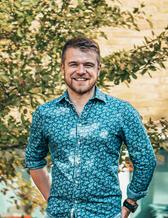Open doors to industry and academia
Sören Stahlschmidt graduated from the Applied Data Science master’s programme in June 2019, and went directly into a trainee programme at SKF in Gothenburg as a Global Graduate.

– The trainee programme is basically a rotational programme where you see different parts of the organization. My home department is at Research and Development, with focus on IT related products.
Sören has been in Sweden for six years now, his bachelor’s degree is in Politcal Science and Economics from University West in Trollhättan.
– The R&D department works with AI and infrastructure in general, but I focus a lot on the management part. My technical knowledge in addition to the soft skills I have acquired in other parts of my career helped me to get chosen for the programme.
– However, I have now been offered a PhD student position in bioinformatics at University of Skövde and will be pursuing that.
Welcoming students from various backgrounds
The Applied Data Science programme is designed to attract students with various backgrounds. Some programming skills are required, as well as mathematics, but a basic course in Python has been added, starting from the fall 2021, to bring the students to more of an equal level.
– Most of us didn’t have a computer science background. Everyone came with a different background and different skillset and that was really interesting to see. Especially in group work, where you can learn a tremendous amount from each other because you have this diversity of backgrounds.
A toolbox to make sense of data
The ADS programme focuses on the challenge of utilizing the vast amount of data that has become available through the digitalization of society. The data can be retrieved from many different domains, everything from biological data or economic data to text from different social media websites.
– The programme will basically set you up with a toolbox that you can use to make sense of these different kinds of data. You can use those tools to, on one hand, understand the data, but also to make predictions from it. And then you can go back to your field of expertise and apply it there.
If you discover that you are interested to go further into computer science and mathematics, the programme offers that possibility through many elective courses.
– If you want to stay and develop new algorithms, it’s up to you to catch up on the computer science part. That way you can develop new tools, to put into other people’s toolboxes.
Tips for future students
• Work hard on the introduction courses, it will pay off!
• Focus both on understanding the theory, and then do the assignments. It’s very important to understand the theoretical background, and then also to apply it in the assignments.
• Be confident! You learn a lot at this programme, and those skills are sought after by companies.
New prerequisites from 2021
The prerequisites for the master's programme in Applied Data Science changed for students starting from fall 2021, making the programme more accessible to international students. The previous requirement of 15 credits programming has now changed to 7.5 credits programming and 7.5 credits mathematics. The programme begins with a 7.5 credits course in Python, to ensure that all students have equal opportunities to complete the programme.
